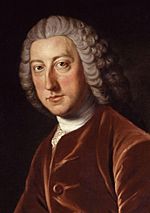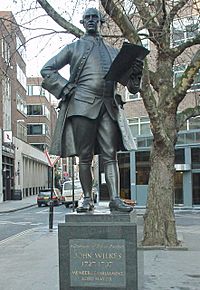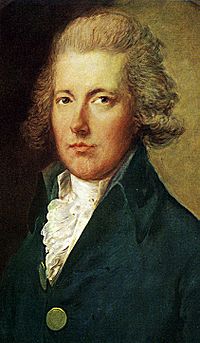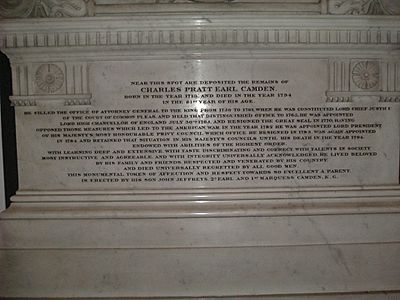Charles Pratt, 1st Earl Camden facts for kids
Quick facts for kids
The Earl Camden
|
|
|---|---|
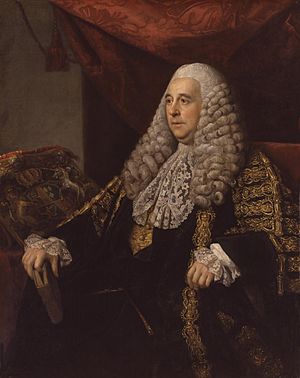
Charles Pratt, 1st Earl Camden by Nathaniel Dance
|
|
| Lord High Chancellor of Great Britain | |
| In office 30 July 1766 – 17 January 1770 |
|
| Monarch | George III |
| Prime Minister | The Earl of Chatham The Duke of Grafton |
| Preceded by | The Earl of Northington |
| Succeeded by | Charles Yorke |
| Lord President of the Council | |
| In office 27 March 1782 – 2 April 1783 |
|
| Monarch | George III |
| Prime Minister | The Marquess of Rockingham The Earl of Shelburne |
| Preceded by | The Earl Bathurst |
| Succeeded by | The Viscount Stormont |
| In office 1 December 1784 – 18 April 1794 |
|
| Monarch | George III |
| Prime Minister | William Pitt the Younger |
| Preceded by | The Earl Gower |
| Succeeded by | The Earl Fitzwilliam |
| Personal details | |
| Born | before 21 March 1714 Kensington, London, England |
| Died | 18 April 1794 (aged 80) |
| Alma mater | King's College, Cambridge |
Charles Pratt, 1st Earl Camden (baptised 21 March 1714 – 18 April 1794) was an important English lawyer, judge, and politician. He was the first person to hold the title of Earl Camden.
As a lawyer and judge, he was a strong supporter of people's rights. He fought for the rights of juries and worked to limit the government's power. He did this in famous court cases, like Entick v Carrington.
He held several high-ranking positions, including Chief Justice of the Common Pleas, Attorney-General, and Lord High Chancellor of Great Britain. He was a close friend and advisor to William Pitt the Elder. Pratt supported Pitt during big arguments about John Wilkes and American independence.
Charles Pratt stayed in government for many years, serving under five different prime ministers. He played a key role in stopping endless copyright and helped solve a major problem about who would rule when the King was sick in 1788. He also supported a law called Fox's Libel Bill, which was important for freedom of the press.
He also started the development of a new area in London, which later became known as Camden Town.
Contents
Early Life and Education
Charles Pratt was born in Kensington, London, in 1714. He came from an old and respected family in Devon. His father, Sir John Pratt, was a very important judge during the reign of King George I.
Charles went to Eton College, a famous school, where he met William Pitt. He then studied at King's College, Cambridge. From a young age, he was very interested in constitutional law, which deals with how a country is governed, and civil liberties, which are people's basic rights.
In 1734, he became a fellow at his college. The next year, he earned his degree. Following his father's path, he began studying law in 1728. Ten years later, he officially became a lawyer.
Starting His Law Career
At first, Charles Pratt worked in common law courts and traveled around the western part of England for cases. For a while, he didn't have many clients and felt very discouraged. He even thought about leaving law to become a church minister.
However, his friend, Sir Robert Henley, encouraged him to keep going. Henley even pretended to be sick once so Pratt could lead a case and get credit. This helped Pratt gain confidence.
In 1749, Pratt married Elizabeth Jeffreys. They had a son, John Jeffreys, who later inherited his titles, and four daughters.
His first big success came in 1752. He defended a bookseller named William Owen, who was accused of publishing a "seditious libel" (a harmful publication against the government). The author had left the country, so Owen faced the charges. Pratt argued that the jury should not only decide if Owen published the book, but also if he intended for it to be harmful. The judge told the jury to find Owen guilty, but the jury disagreed and found him not guilty. This case brought Pratt to public attention. In 1755, he became a King's Counsel, a special title for experienced lawyers. He was knighted in 1761.
Political Journey
William Pitt had always asked Pratt for advice on legal matters. Pratt joined a group of politicians who were against the current government. In 1757, Pitt became prime minister and insisted that Pratt be appointed Attorney-General, the chief legal advisor to the government.
That same year, Pratt became a Member of Parliament (MP) for Downton. He served in Parliament for four years. He introduced a bill in 1758 to expand the writ of Habeas corpus, which protects people from unlawful imprisonment. This bill aimed to apply it to civil and political cases, but it did not pass in the House of Lords.
As Attorney-General, Pratt prosecuted a French spy and a writer who published articles against the government. It's important to note that he only started one official prosecution for libel, showing his moderate approach. He continued to insist that juries should decide such cases.
Wilkes and Entick Cases
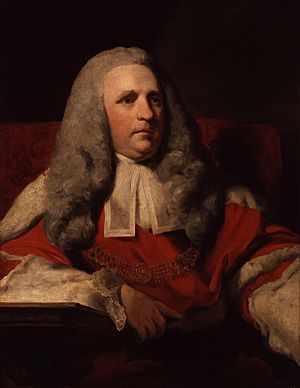
In 1762, Pratt became Chief Justice of the Common Pleas and was sworn into the Privy Council.
In 1763, Member of Parliament John Wilkes was arrested for publishing an article that was considered seditious. Pratt freed Wilkes, ruling that his parliamentary privilege protected him from arrest for such a charge. This decision made Pratt very popular with people who wanted more rights. He also said that general warrants (broad search warrants) were illegal. This made him a hero for defending English civil liberties. He received many honors from cities and towns.
In another important case, Entick v Carrington (1765), Pratt ruled that government officials could not raid someone's home without a specific legal reason. This meant that such raids were against the law unless a statute or common law allowed them.
The American Stamp Act Crisis
In 1765, Charles Pratt was given the title Baron Camden. This made him a member of the House of Lords. He became involved in the crisis over the Stamp Act 1765, which was a tax on American colonies.
Camden believed that people should only be taxed if they had a say in the government (representation). He was one of only five Lords who voted against the Declaratory Act. This act said that the British Parliament had the right to tax colonies overseas.
Becoming Lord Chancellor
In 1766, William Pitt became prime minister again. He promoted Camden to Lord High Chancellor of Great Britain. Camden did a good job in this role. He oversaw the Court of Chancery, a court that dealt with fairness and property. Only one of his decisions was overturned.
He also presided over cases in the House of Lords. In 1767, he agreed with a ruling that the City of London could not fine people who refused to serve the city because of their religious beliefs.
"A Forty Days Tyranny"
In 1766, a poor harvest led to fears of high food prices. Parliament was not meeting, so it couldn't renew a ban on exporting grain. Pitt, with Camden's support, used the Privy Council to issue a royal order to stop grain exports.
However, this order was against the law, specifically the Bill of Rights 1689. Both houses of Parliament accused Pitt and Camden of acting like tyrants. Camden argued it was necessary, calling it "a forty days tyranny." The government had to pass a special law to protect those involved from legal action.
America and Taxes
In 1767, the government, including Camden, approved new taxes on the American colonies. These were called the Townshend Acts. Benjamin Franklin had suggested that colonists might not object to import duties. Camden's support for these taxes would later cause him trouble.
Pitt and Camden had supported the Declaratory Act of 1766, which said Britain had power over the American colonies. When unrest continued in America, Camden spoke for Pitt in the Lords. However, Pitt became ill, and the Duke of Grafton took over. Camden became unsure about his political role.
Camden opposed Lord Hillsborough's harsh approach to America. He favored peaceful solutions and new tax ideas. Camden even promised the colonies that no more taxes would be placed on them. He voted with the minority in the cabinet who wanted to remove the tea tax.
John Wilkes and Parliament
In 1768, John Wilkes was elected as a Member of Parliament for Middlesex. The government wanted to remove him. Camden said that Parliament could expel Wilkes, even if he was lawfully elected. However, Camden knew this would likely lead to Wilkes being re-elected, causing more problems.
The government decided to expel Wilkes. By late 1769, Camden was openly against the government's policies. King George III wanted him to stay in his job. But in January 1770, Pitt returned and opposed the government's policies on Wilkes and America. Camden supported Pitt and resigned as Lord Chancellor on January 17, 1770, because the King was angry with his actions.
Later Political Life
In Opposition
After resigning, Camden joined the opposition in the House of Lords. He continued to argue with Lord Mansfield about the law of libel. Camden believed that juries should decide not only if a work was published, but also if its words were harmful.
In 1774, in a case about perpetual copyright, Camden spoke against the idea of endless copyright. He feared it would stop new learning and ideas from spreading. His speech helped lead to the rejection of a bill that would have allowed perpetual copyright.
The American Crisis of 1774
In 1774, another crisis arose over America after the Boston Tea Party. Lord North wanted to blockade Boston. Camden criticized the taxes that caused the protests. However, he was reminded that he was Lord Chancellor when those taxes were imposed.
By May, Camden began to oppose the blockade, fearing it would strengthen American resistance. In 1775, Camden gave a major speech against a bill that would lead to war with America. He said that resistance to tyranny was justified. He believed that England would eventually lose control of America.
American War of Independence
When the American War of Independence began in 1775, Camden continued to speak in Parliament. He strongly opposed taxing the American colonists. In 1778, he signed a protest from the Lords about the war.
In 1782, he became Lord President of the Council under a new government. He supported economic reforms and efforts to fight corruption. He also championed the repeal of the Declaratory Act 1720 in Ireland. When the prime minister died, Camden resigned.
Working with William Pitt the Younger
Camden strongly opposed the next government, calling it corrupt. When William Pitt the Younger, the son of his old friend, became prime minister in 1783, Camden was reappointed as Lord President. He held this job until his death. In 1786, he was made Earl Camden.
Camden actively participated in important debates. He supported Pitt's plans for parliamentary reform and trade with Ireland. Even when his health declined, cabinet meetings were sometimes held at his home.
Regency Crisis of 1788
In 1788, King George III became ill, and people worried he was losing his mind. As Lord President, Camden led the Privy Council's examination of the King's doctors. With the Lord Chancellor unsure what to do, Camden took charge. He asked Parliament to appoint a regent (a temporary ruler).
Camden's idea that Parliament should choose the regent passed in the Lords. He then proposed that the Prince of Wales be appointed regent, but with limits in case the King recovered. The King recovered the next month before the bill became law.
Fox's Libel Act
Until his last years, Camden strongly defended his views on juries. He believed juries should decide all parts of libel cases, including whether the words were intended to be harmful. In a debate in 1792, Camden argued that judging intent in libel cases was like judging intent in murder cases. He said that freedom of the press depended on juries, not judges, who might be influenced by the government. Despite opposition from other legal experts, Camden's speech helped pass the Libel Act 1792.
Legacy
Charles Pratt, Earl Camden, died in London on April 18, 1794. He was buried in Seal church in Kent. He was a wealthy man, partly due to his wife's inheritance.
Many people, including famous legal historians, considered Camden a great Lord Chancellor. They saw him as a brilliant lawyer and a strong defender of legal principles.
One historian said that Camden was "a great constitutional lawyer, a great legal historian, and a great common lawyer." He was seen as a worthy successor to other famous judges like Coke and Hale.
In his later years, Camden took a great interest in Robert Stewart, 2nd Marquess of Londonderry, his daughter's stepson. Camden saw great potential in young Robert and treated him like his own grandson.
In 1788, he received permission to develop some land he owned north of London. In 1791, he divided the land into plots and leased them for building 1,400 houses. This was the beginning of Camden Town.
Several places in the United States are named after him. These include Camden, Maine, Camden, South Carolina, Camden, North Carolina, and Camden, New Jersey. There are also Camden Counties in New Jersey, Missouri, and Georgia. Pratt Street in Baltimore is also partly named after him.
|
 | William M. Jackson |
 | Juan E. Gilbert |
 | Neil deGrasse Tyson |


